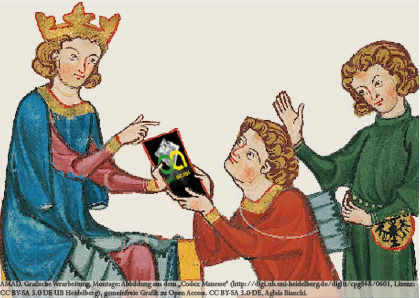AMAD
„Archivum Medii Aevi Digitale - Interdisziplinäres Open-Access-Fachrepositorium und Wissenschaftsblog für Mittelalterforschung‟Zur Einreichung

| Datum: | 2009 |
| Titel: | Boccaccio (comico) nel teatro (comico) di Machiavelli |
| Autor*in: | Perocco, Daria |
| Beschreibung: | Molti critici hanno posto in parallelo Boccaccio e Machiavelli: cronologicamente, il primo testo trovato è una lettera di Girolamo Muzio del 1535. Oltre alla presenza del Decameron nella Mandragola, la cui influenza viene ulteriormente sottolineata, lo studio è orientato in funzione della Clizia, in cui lo stesso Machiavelli sembra allontanarsi e sfuggire dalle situazioni ironicamente boccaccesche che egli stesso aveva poco tempo prima creato per rifugiarsi in un linguaggio estremamente più piano e posato, quello che stava diventando predominante, dell’imitazione plautina e terenziana. A proposito viene anche riportato un significativo passo della traduzione dell’Andria. Vengono poi esaminati alcuni temi chiave: le donne, i vecchi e i giovani, la paura della maldicenza, le abilità sessuali dei personaggi, i giochi linguistici di attesa che implicano una teatralità dirompente, tutti letti nella ripresa più o meno letterale (ma sempre indicata) dai testi di Boccaccio. La conclusione è che Machiavelli, nel riprendere il Boccaccio comico, si diverte nel compiere un gioco equivoco con i termini usati: l’equivoco può sembrare della stessa natura, ma in un autore può addirittura diventare parodia del significato di quello che è nell’altro. ; Many critics have placed Boccaccio and Machiavelli side by side. Chronologically, the first text we find is a letter written by Girolamo Muzio in 1535. Besides the presence of the Decameron in Mandragola, the influence is further underlined as we allow Clizia to guide the study. In this work Machiavelli seems to distance himself and flee from ironically Boccaccio-esque situations that he himself had created just slightly earlier in order to take refuge in extremely flat and composed language. This sober language which imitated Plautus and Terrence was becoming dominant at the time. In this line of investigation a significant passage from the translation of Andria is analyzed. Then some key themes are examined: women, old age and youth, fear of curses, the sexual skill of the characters, the linguistic waiting games involving unsettling theatrics, all of which are taken more or less literally (but always clearly) from the texts of Boccaccio. The conclusion is that in taking from Boccaccio’s comedies, Machiavelli enjoys playing a game of ambiguity with the terms used. This ambiguity may seem to be of the same nature, but in it one author can even parody the meaning of the other author. |
| URI: | https://www.amad.org/jspui/handle/123456789/109055 |
| Quelle: | http://ddd.uab.cat/record/52020 |
| AMAD ID: | 587442 |
| Enthalten in den Sammlungen: | BASE (Bielefeld Academic Search Engine) General history of Europe |

